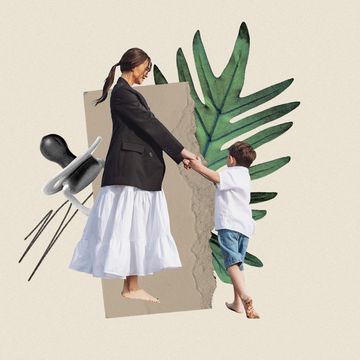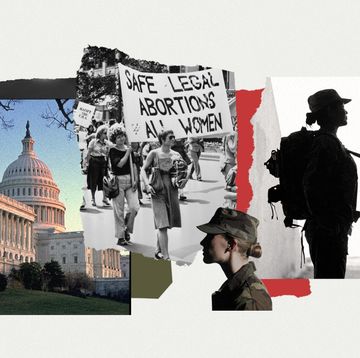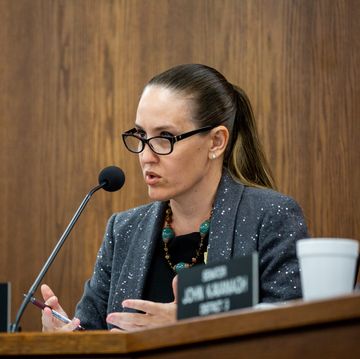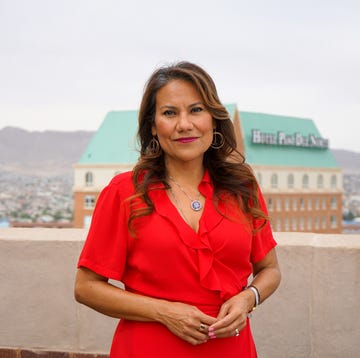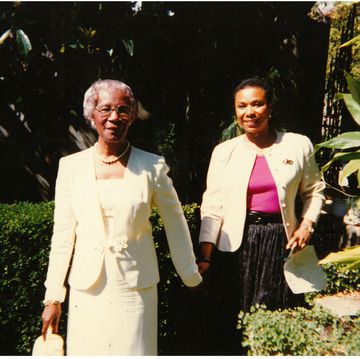This article appears in the December 2014 issue of ELLE magazine.
Professor Bolin, or Brianne, as she tells her students to call her, might as well be invisible. When I arrive at the building at Columbia College in Chicago where she teaches composition, I ask the assistant at the front desk how to locate her. "Bolin?" she asks, sounding puzzled, as she scans the faculty list. "I'm sorry, I don't see that name." There is no Brianne Bolin to be found, even though she's taught four classes a year here for the past five years. She doesn't have a phone extension to her name, never mind an office.
The mother of a disabled eight-year-old boy named Finn, Bolin rushes in late to the lobby—she'd offered to give me a tour of her workplace. Her red hair is pulled back in a ponytail, and red electrical tape is wrapped around the left temple of her black geek-chic glasses; they broke a few months ago, and she can't afford a new pair. Bolin dressed up for the occasion: a black vest (from a thrift store, she'll tell me later), jeans (also thrift), and a brass anatomical version of a heart dangling at her throat from a thin black string. This is a rare and coveted evening off for her—Finn's father's fiancé agreed to babysit—but so far she's too agitated to enjoy it. She just learned that the woman and Finn's father, a blacksmith, are getting married in a few weeks, and they won't be able to take care of the boy during that time. It's all on her, again.
After she shows me the computer lab and some of the students' abstract photography and video installations, we settle down to talk in the student lounge, which features sleek modern furniture and high-rent views of the city's Grant Park and Lake Michigan. By this time, Bolin seems more angry than anxious. An adjunct professor, she earns $4,350 a class, never more than $24,000 a year, she says. At the moment, she has $55 in the bank and $3,000 in credit card debt. She is a month behind on the $975 rent she pays for a two-bedroom house next to railroad tracks in a western Chicago suburb, where every 20 minutes a train screeches by. Her bookshelves are full of poetry and philosophy from grad school, she can recite poems from memory, and she collects French 1960s LPs, but she must rely on food stamps to feed herself and her son. And because her job doesn't offer health insurance, they're both enrolled in Medicaid, the state and federal health-care program for the poor. (Coverage for a child Finn's age in Illinois caps at an income equaling 142 percent of the federal poverty level, or about $22,336.)
It wasn't supposed to be this way. Bolin, the English major, knows that's a cliché, but she can't help thinking it all the time. It wasn't supposed to be this way. In college at Eastern Illinois University downstate, she inhaled books—lived "in a trailer park with a friend, reading the novels of Virginia Woolf and Marguerite Duras, getting into Kerouac and Ginsberg and that Beat rebellion thing," she recalls. She earned a bachelor's and a master's, studying avant-garde poetry. She didn't expect to become an academic star—Eastern Illinois wasn't the University of Chicago—but she did assume she'd have a steady job with adequate pay. "I like nice things—I'm a little bourgeois," she says. "I thought at 35, I'd have clothes without holes in them and money in the bank, but I shop at Goodwill exclusively. I wear Banana Republic $5 suit jackets that wear out quickly because they've already been worn so much beforehand….
"My dreams did this to me. It's not a shameful thing, although I wonder if there is something wrong with me."
Much political rhetoric these days is devoted to the importance of broadening access to college—and there is plenty of evidence that it's still better financially to have a degree than not—but in the postcrash world of 2014, a good education may not keep you from hovering near the poverty line. The number of people with graduate degrees receiving food assistance or other forms of federal aid nearly tripled between 2007 and 2010, according to the U.S. Census. More specifically, 28 percent of food-stamp households were headed by a person with at least some college education in 2013, compared with 8 percent in 1980, according to an analysis by University of Kentucky economists.
The hypereducated poor, as I've come to think of them, are as hidden to the country at large as Bolin is at Columbia. "Nobody knows or cares that I have a PhD, living in the trailer park," says a former linguistics adjunct and mother of one child, who lives in Eugene, Oregon, and was on welfare and food stamps. A St. Paul, Minnesota, librarian, who admits that few of her friends have any clue how broke she is, puts it this way: "Every American thinks they're a temporarily embarrassed millionaire: I am no exception."
Bolin keeps in touch online with a large circle of her fellow travelers, including Justin Thomas, a friend from college who has a master's degree in history. An adjunct at Lake Land College, about three hours south of Chicago, Thomas teaches between four and six classes a semester, earning between $1,500 and $3,087 per class. His paychecks arrive a month after each semester begins, he says, and during those four weeks it's macaroni and cheese and baked potatoes every night for his two daughters. (Because he doesn't have full custody of them, he isn't eligible for food stamps.) "I say, 'Sorry I can't afford to buy you anything, even an ice cream,'" he says, getting choked up as he adds, "For me to help my daughters with their dreams, I have to give up my dreams." Though he has been moonlighting for his father in construction, money remains tight. "I'd love to get my daughter music lessons—she's talented. But right now I don't have the resources to take advantage of her ability."
It's not just academics who are highly educated and downwardly mobile. Employment for recent law school graduates fell from 92 percent in 2007 to 84.5 percent in 2012, according to the National Association for Law Placement, and the average law student's debt was about $100,000. Other professions that haven't regained many of the jobs lost during the recession include architecture, market research, data processing, book publishing, human resources, and finance—all of which either require or tend to attract workers with a master's degree.
Bolin was different from the other kids at her school in small-town central Illinois. For starters, she was adopted and an only child. Early on, she tested into a gifted program and was the kind of smart her mother proudly calls "scary," though it morphed into "troubled" when she became a teenager. In high school, she didn't fit in—she was very emotional, she says, wore all black and read all the time.
At college, however, she quickly felt like she'd found her place in the world. "Literature gave life an extra resonance," she says. Then, in her sophomore year, Bolin's boyfriend was murdered by his roommate. The trauma led her to dive yet more deeply into literature, especially poets such as William Carlos Williams and George Oppen. What was the soul? she wondered. Was her boyfriend's out there? "I had camaraderie in a personal way with the authors I studied," she says. "I was a lonely person—I still am—and books made the world a more beautiful place."
No one at her college mentioned that becoming an academic might not be the wisest career path, she says. Instead, her favorite professor, Michael Loudon, who taught American Romanticism, encouraged her to come to his office and sit and talk. (He is now retired.) "He had faith in me: He knew I'd continue with the ideas I was working with and write a dissertation. No, he didn't think I'd have a big career, but he was sure I'd have decent work. That was a given."
But during Loudon's collegiate era at least 75 percent of professors were tenured or tenure-track (a status that includes health benefits), while the exact reverse is true today: 75 percent are adjuncts or part-timers like Bolin. This sea change in academia had begun by the time Bolin went to college, but neither she nor her parents were aware of it. Her father, who hadn't gone to college, worked building tires for Firestone; her mother was a homemaker who had an undergraduate degree in home economics. "Clocking in at nine and home by dinnertime," Bolin says of her dad. He worked to live, not the other way around, and he didn't necessarily understand his daughter's quest for work she loved.
Nevertheless, Bolin's parents, who paid for her undergraduate education with savings, were impressed when in her midtwenties she graduated and immediately started teaching composition at Westwood College in Chicago. (Soon after, she switched to Columbia.) She'd hoped to teach literature, but she came to love basic writing and comp, she says, relishing the process of helping her students learn to write cogently. And Chicago thrilled her. She'd never seen people of so many races and nationalities. She could hear eclectic music night after night: klezmer, Balkan folk music. She even formed her own two-piece band, Mud Show, with a cast of instruments such as an accordion, a bass made from a steamer trunk, a bucket of chains, and a typewriter. "I was making it financially, but I was living as a 26-year-old in the city, with several roommates, hosting house parties with live music, enjoying life," she says. "I had no serious partner and no future plans. I was living an extended youth."
Then, at 28, she got pregnant, the result of a random hookup with a 20-year-old in a band she liked. She knew she'd be raising her child mostly on her own, but Bolin says she never considered not having the baby. To make matters more difficult, Finn was born with quadri plegic cerebral palsy. To devote herself to his care, she quit work for several years and moved back in with her parents. Her mother remained proud of her daughter, no longer as an academic but now as a caretaker of a boy with bright blue eyes and a crown of sandy brown hair who can't eat or walk without assistance, whose ribbon-thin body must be lifted in and out of his wheelchair many times a day.
In 2008, when Finn was two, Bolin returned to Chicago and started teaching as many classes as she could get from Columbia, but her boss recently warned her that she'll never get a permanent job. "[Academia] just isn't a career choice anymore," Bolin says.
One reaction to Bolin's plight might be, Get over yourself! Find something that pays the bills! Or, as Karen Kelsky, a former anthropology professor who founded a counseling service called The Professor Is In, has put it: Find a "real job." Her clients pay $300 an hour for e-mail counsel about how to reinvent themselves, and, sometimes, to express "rage, despair, and disappointment" about their disappearing profession, Kelsky says. "Adjuncts can accrue massive debt to support their children, destroy their health, teach at five campuses, in a professional death spiral. Once you've given it your best shot, it's time to move on." She helps people with postgraduate degrees to identify other marketable skills, such as analysis, data gathering, writing, and public speaking.
Bolin is an avid follower of Kelsky's blog (she can't afford her one-on-one service, perhaps needless to say), and though Kelsky's advice sounds sensible, Bolin, already stretched thin working and caring for her son, says she struggles to find time to send out her résumé or get additional training, the latter of which isn't free, of course. She has thought about supplementing her income with some kind of retail job, but Finn's child-care costs would eat up her paycheck. She started to train as a speech-language pathologist a few years ago—her son has needed speech therapy since birth—but the further along she got in her studies the more despondent she became, she says, and she eventually dropped out: Her experiences with her own son were traumatic enough. Lately she's been looking into work as a campus union organizer, to capitalize on her interest in improving adjuncts' lot, but so far that hasn't really panned out either.
Yet Bolin's situation is not just the result of too few hours in the day. As social psychologists who study what's known as "decision fatigue" have found, being poor takes a huge amount of mental work. There is a constant need to weigh the merits of spending even the smallest amounts of money: Yes, maybe I should buy a few extra bars of that seriously marked-down soap—one of the experimental conditions tested by a Princeton economist in poor Indian villages—but wait, then I can't afford this week's medicine, food, school fees, et cetera.
Tagging along with Bolin at Trader Joe's, I saw how wearing it was for her to try to stay within her monthly $349 food-stamp budget, for which she qualifies only in the summer, when school isn't in session. (She also can apply for about $600 in Supplemental Security disability payments in months when she earns less than $2,000.) Finn must have expensive almond and rice milk—he's lactose intolerant—but then Bolin is on the hunt for the 59-cent-per-pound giant bag of chicken legs, 49-cent bag of carrots, and forget about buying anything other than the absolute cheapest ground beef. "I read blogs about people wasting $20 on frivolous things like a photo booth or fancy cheese," she says. "I'll never do that."
The point of the social-psychology research is that when so much mental activity is devoted to basic survival, little is left to engage in long-term thinking or to muster willpower—which Bolin well knows. "I need to smoke to relieve the pressure," she tells me as she feverishly rolls her own cigarettes one evening when I take her out to a bar, where she also finds relief in the form of plentiful margaritas. She's self-medicating, she says; other times, she uses Xanax for anxiety. She also takes a daily antidepressant. As Linda Tirado, whose rawly honest blog post on her own minimum-wage existence catapulted her into the national spotlight last year, bluntly writes in her new book, Hand to Mouth: "Being poor while working hard is fucking crushing."
Bolin's desperation comes through perhaps most poignantly when she takes me to her favorite Chicago neighborhood, Andersonville. Her education has influenced her tastes, and she peers longingly into shopwindows filled with midcentury antiques, wax flowers, handmade hats, toffee made with European beer. She tells me she's a foodie and loves pasta with cream sauce and shrimp cocktail, as well as the "opera cake" sold at the tourist-ready Austrian bakery, but the cafés and restaurants here are as out of her reach as the rents, which are around double those in Brookfield, where she lives. She stops in a feminist bookstore, wishing she could spring for a book on sex and feminism, or a new collection of essays on living in the Internet age.
The next day, Bolin and I spend the afternoon pushing Finn in his wheelchair through Chicago's Lincoln Park. At a playground, Finn rushes down the slide on his stomach, with a big smile on his face, but at other times he screams in frustration at his physical limitations—he just wants to run or kick a ball. What Bolin wants shouldn't be so hard to achieve: a steady version of the job she has now, making $35,000 a year. "Finn would be okay with that," she says simply. She'd be able to afford the next size up in a tricycle for him—though he can barely walk, he loves to ride. Bolin also says she hopes to find a partner to love and share practical tasks such as child care, but she hasn't met anyone who seems right for a serious relationship.
With twilight approaching, she points out an attractive dark-haired couple sitting with their toddler son on a bench, a fancy stroller parked next to them. "When I see couples who have jobs," she says, "couples who look perfect, I want to ask them: 'How did you do it?'"
This article was reported in partnership with The Investigative Fund at The Nation Institute.
Related: Chelsea Clinton on How to Make Global Education for Girls a Priority




